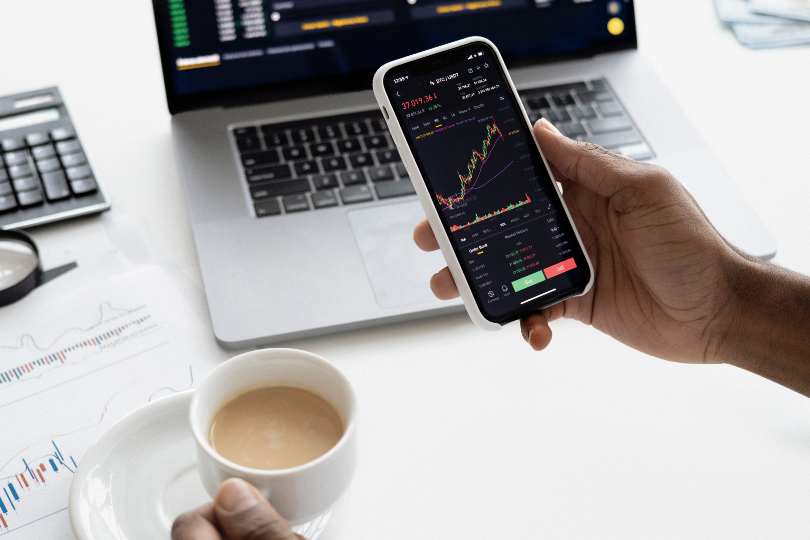In its simplest form, a share (also known as a stock) is a unit of value in a specific company or entity. The company will undergo a valuation which will help determine the value of its shares when it lists on the relevant stock exchange. If for example a company is valued at £100 million and there are 100 million shares available, each share will be worth £1.
Shares increase and decrease in value, however, investors like yourself, will purchase a share in the hope that the continued success of the company will drive the value of the share up so they can make a profit when they sell the share.
- Choose a trading platform. If you’re unsure which one to choose, see my guide to the best trading platforms UK.
- Open an account. You will need your national insurance number, personal ID and bank details.
- Enter payment details. Fund your new trading account via a debit card or bank transfer.
- Search for the stock code on your trading platform. Search for the stocks and shares you want to buy.
- Research shares information. Your trading platform can show you the latest information for the shares you want to buy.
- Now buy your shares. Go ahead if you’re happy to buy the stocks and shares you’ve chosen.
If you’re looking to buy shares but unsure where to start, my definitive guide will walk you through everything you need to know, including understanding what a share is, ways of owning a share, time frames, and where to buy and sell UK stocks and shares.
Want to know how to buy shares?
Happily buying shares has now become accessible to everyone with the emergence of online share dealing platforms. These online platforms list the shares of companies that are listed on a stock exchange. The main exchange in the UK is called the London Stock Exchange, and here you will find shares in all the major companies and household names. There is also the Alternative Investment Market or AIM, where shares can be found from small developing countries. Remember, in order to buy shares in any company, they must first be listed on a stock exchange.
Selecting which shares to buy is a more complex process and requires some in-depth knowledge of the companies you are considering and their current financials. Many share dealing platforms offer access to research on the companies they have listed to help you make informed decisions. Always remember that past performance is no guarantee of future results.
Share dealing platforms are the cheapest way to buy shares, however, there are still associated costs with buying and selling shares and you should be aware of these before you proceed. More often than not, there is a trading fee which you are charged each time you make a transaction, however, there are a few platforms that offer commission-free trading so you can buy and sell shares for free.
Are all companies listed on a stock exchange?
No not all companies are listed on the stock exchange. In order for a company to be listed on a stock exchange, it must first have gone through an Initial Public Offering or IPO.
This is the process by which a company first offers to sell its shares to the general public and institutional investors.
At this point the company has yet to list its shares on the stock market, however, they can be purchased through certain providers and will often be available at a discounted price. The hope for investors is that shares purchased during an IPO will increase in value on their first day of trading, however, this is a very risky strategy and the value of shares can in fact decrease once listed.
During the IPO you will be purchasing shares directly from the company in question before retail investors have the opportunity to buy and sell shares among themselves. Once the IPO is completed, the company’s shares will be listed on the stock market and will be available to buy and sell.
Find out more about how to trade IPOs in our Guide to Trading IPOs in the UK.
What are the two ways of owning a share?
There are two main ways of owning a share which are:
- Owning the share as an individual
- Combining your investment money with other individuals in order to invest as a group and therefore reduce the associated risks of the investment. This is known as a fund.
What are the advantages of investing in a fund?
Investing in a fund is the most popular way to invest for many investors as the collective pooling of money enables investors to own shares in more companies and therefore reduce the risks associated with owning shares in just one company.
This is because should the company you are invested in get into any sort of difficulty, you could end up losing all your capital. Conversely, owning shares in lots of companies will ensure that should one company lose ground, the other companies can help soften the blow to your portfolio. Investing in a fund also offers the following advantages:
Professional Portfolio Management
A fund will usually come with an annual management fee which you will need to factor into your costs. This management fee covers the cost for a professional manager to buy and sell shares on your behalf and continuously make adjustments in line with fluctuations in the marketplace.
Reinvesting Dividends
Any dividends earned by the funds can be used by your fund manager to purchase additional shares in order to help the fund grow.
Mitigating Risk
Your fund manager will ensure that you are properly diversified in order to ensure your risk is as mitigated as possible whilst also ensuring the best possible returns. Many funds will own in the region of 1,000 or more individual stocks across a varying range of securities.
How long should you invest for?
The value of shares can fluctuate up and down which can result in investors engaging in panicked decision making. It’s difficult to watch the value of your shares fall while you do nothing and many people will take action and sell their shares as they fall.
However, once you have sold a share that is falling in value, you have essentially locked in that loss. The main thing to remember about shares is that they will fluctuate in value, going up and down over short periods of time. However, over the long run, shares will usually go up. Therefore a trader should seek to avoid market sentiment and refrain from selling all their shares as soon as they drop in price.
Holding investments over the long term is by far the best way to mitigate risk and gives you time to ride out any bumps in the marketplace. Therefore, professionals will always recommend that you plan to hold your investments for at least five years before you attempt to sell them. This also provides scope for your investments to compound and grow, earning you better returns.
If you aren’t thinking about owning a stock for 10 years, don’t even think about owning it for 10 minutes.
Warren Buffett
How many shares should you hold?
So what’s the magic number? The real answer is that it isn’t as straightforward as that.
I have already covered the importance of diversifying your portfolio in order to mitigate your risk. Diversifying your portfolio is done by buying different stocks, from different sectors and different geographies, so a crash in one area of the stock market needn’t be a catastrophe for your entire portfolio.
Reliable blue-chip companies will present much less risk to your portfolio and therefore you won’t need as many shares as you would if you were buying much riskier start-up shares.
It is of course possible to over-diversify, at which point it can become impossible to keep track of all your shares and you will risk spreading yourself too thin. Always remember that you will need to keep abreast of all news on any company that you own shares in order to anticipate changes to the market.




